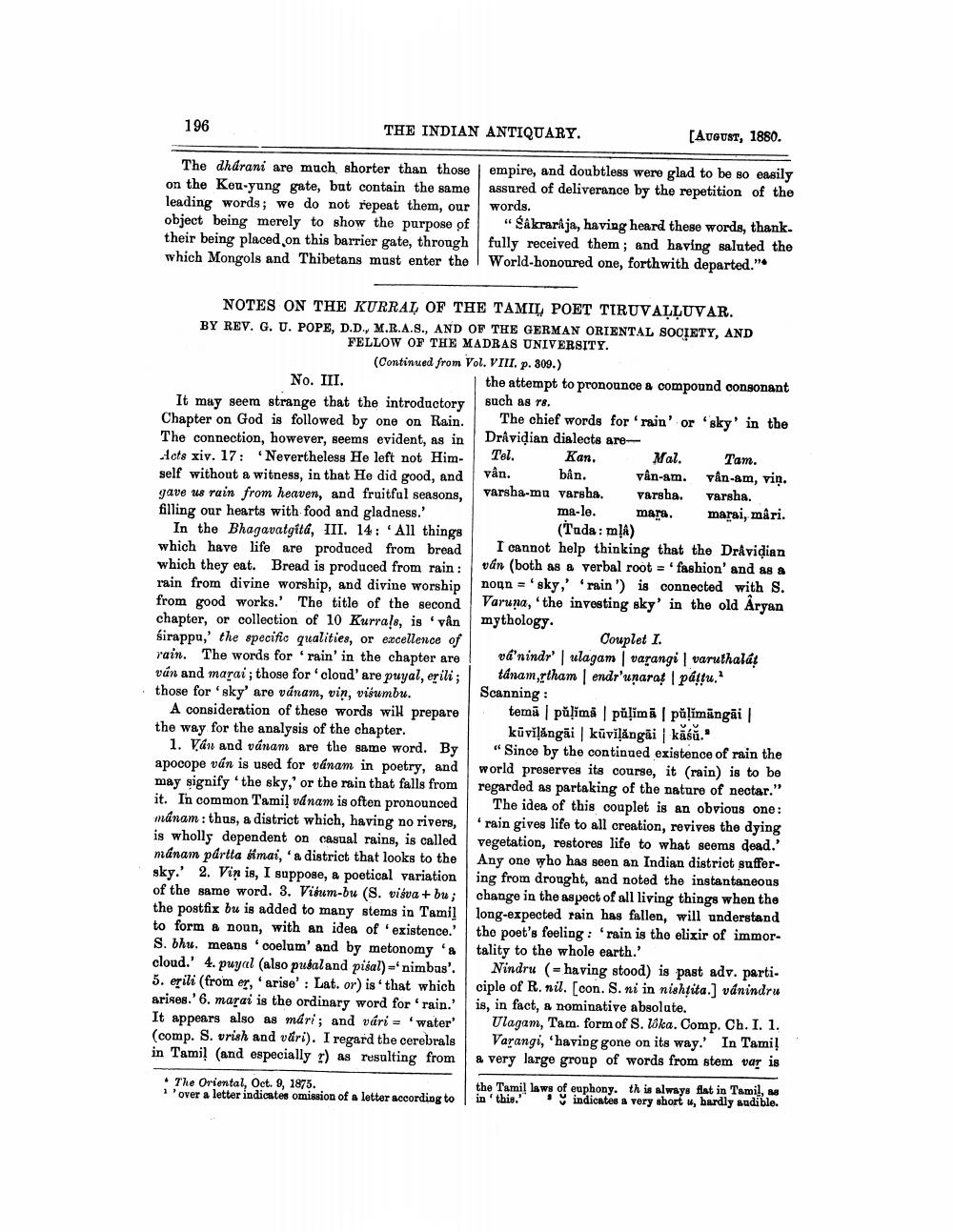________________
196
THE INDIAN ANTIQUARY.
[AUGUST, 1880.
The dhárani are much shorter than those empire, and doubtless were glad to be so easily on the Keu-yung gate, but contain the same assured of deliverance by the repetition of the leading words; we do not repeat them, our words. object being merely to show the purpose of "Sakraraja, having heard these words, thank. their being placed on this barrier gate, through fully received them; and having saluted the which Mongols and Thibetans must enter the World-honoured one, forth with departed."
NOTES ON THE KURRAL OF THE TAMIL POET TIRUVALLUVAR. BY REV. G. U. POPE, D.D., M.R.A.S., AND OF THE GERMAN ORIENTAL SOCIETY, AND
FELLOW OF THE MADRAS UNIVERSITY.
(Continued from Vol. VIII. p. 309.) No. III.
the attempt to pronounce & compound consonant It may seem strange that the introductory such as ts. Chapter on God is followed by one on Rain.
The chief words for 'rain' or 'sky' in the The connection, however, seems evident, as in Drâvidian dialects aredets xiv. 17: Nevertheless He left not Him
Tel. Kan. Mal. Tam. self without a witness, in that Ho did good, and
vấn. bân. vân-am. vấn-am, in. gave us rain from heaven, and fruitful seasons,
varsha-mu varsha v arsha. Varsha. filling our hearts with food and gladness.'
ma-le. mara. marai, mâri. In the Bhagavatgitá, III. 14: 'All things
(Tada: m?A) which have life are produced from bread
I cannot help thinking that the Dravidian which they eat. Bread is produced from rain:
van (both as a verbal root = 'fashion' and as a rain from divine worship, and divine worship
noun = 'sky,' 'rain') is connected with S. from good works.' The title of the second Varuna, 'the investing sky' in the old Aryan chapter, or collection of 10 Kurrals, is van mythology. sirappu,' the specific qualities, or excellence of
Couplet 1. rain. The words for 'rain' in the chapter are vá'nindr' ulagam | varangi varuthalát ván and marai; those for cloud' are puyal, erili; I tanam,rtham | endr'unarat | pattu." those forsky' are vánam, vin, visumbu. Scanning:
A consideration of these words will prepare tema pățima pūļimā pūļimāngai the way for the analysis of the chapter.
kūviļăngäi kūviļăngāi | kăsă. 1. Van and vanam are the same word. By "Since by the continued existence of rain the apocope ván is used for vánam in poetry, and world preserves its course, it (rain) is to be may signify the sky,' or the rain that falls from regarded as partaking of the nature of nectar." it. In common Tamil vanam is often pronounced The idea of this couplet is an obvious one: mánam : thus, a district which, having no rivers, rain gives life to all creation, revives the dying is wholly dependent on casual rains, is called vegetation, restores life to what seems dead.' manam pártta simai,' a district that looks to the Any one who has seen an Indian district suffersky. 2. Vin is, I suppose, a poetical variation ing from drought, and noted the instantaneous of the same word. 3. Visum-bu (S. visva + bu; change in the aspect of all living things when the the postfix bu is added to many stems in Tamil long-expected rain has fallen, will understand to form a noun, with an idea of existence.' the poet's feeling: rain is the elixir of immorS. bhr. means 'coelum' and by metonomy 'a tality to the whole earth.' cloud.' 4. puyal (also pusaland pisal)-nimbas'. Nindru (having stood) is past adv. parti. 5. erili (from er, arise': Lat. or) is that which ciple of R. nil. [con. S. ni in nishtita.] vánindru arises.' 6. marai is the ordinary word for 'rain.' is, in fact, a nominative absolate. It appears also as mari; and vári = 'water Ulagam, Tam. form of S. láka. Comp. Ch. I. 1. (comp. S. vrish and vari). I regard the cerebrals Varangi, 'having gone on its way.' In Tamil in Tamil (and especially r) as resulting from a very large group of words from stem var is
• The Oriental, Oct. 9, 1875. 1 'over a letter indicates omission of a letter according to
the Tamil laws of euphony. th is always flat in Tamil, as in this indicates a very short u, hardly audible.




